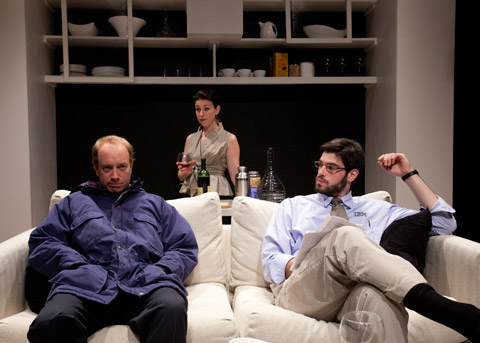
GOOD DEAL The Orfeo Group actors (Gabriel Kuttner, Liz Hayes, Daniel Berger-Jones) play John Kolvenbach’s piece to its sometimes over-the-top, risk-taking hilt. |
Comedy and metaphor collide in the plays of John Kolvenbach.
Fabuloso, in which wacky guests invade the home of a complacent married couple, seems a harmless sitcom until you realize that the onslaught of the visitors, in a swirl of enlivening chaos, is a stand-in for having a baby. The 2006
Love Song, to which Orfeo Group is giving a bristling Boston premiere (at Charlestown Working Theater through August 27), also fields a catalytic intruder who is not what she seems. Molly is an angry, aggressive burglar who breaks into the apartment of a nowhere man named Beane, then sticks around to berate him for having nothing to steal but a spare pair of pants and his heart — both of which she unapologetically makes her own.
Meanwhile, at the other end of a long, narrow playing space with the audience on both sides, Beane's business-clad, Bordeaux-swilling razor blade of a sister, Joan, spars with her husband, Harry, in modern digs as different from Beane's bare room — with its rickety beach chair and a threatening floor lamp — as she is from her mentally ill brother.
Not that Joan and Harry are uncaring: early on, Harry enthusiastically subjects the introverted Beane to a diagnostic personality test. And the subject responds to the first question with such an amusing mix of morbidity and literalism that you long to hear him answer a few more inane interrogatives. Really, the guy is such a sad sack that you hate to laugh at him (though you will, as would Jesus or even the kindest of social workers). Then Beane goes home to his darkened lair, encounters Molly, and is transformed from a nebbish who lacks the courage to want things to a man who cannot get enough — of sex or sandwiches or the exuberant song of himself. Moreover, his liberated, logorrheic embrace of fantasy and appetite trickles down to Harry and Joan, into whose uptight lives hedonism and whimsy worm their way.
But the threads of comedy and metaphor are not terribly well wound in Love Song. The softening, even flaking, of Joan, touchingly conveyed by Liz Hayes, helps tighten the skein. And much of the play — particularly the scenes in which Joan and Harry loosen up, smoking imaginary cigarettes and confessing to sexual arousal by cantaloupe — is funny in a refreshingly quirky way. But then it falls to Beane and Molly to trace the trajectory of their somewhat cannibalistic love across a desolate landscape of "discarded gum" and body fluids. These earnest, incantatory exchanges can seem melodramatic, even a bit clichéd. And when the big revelation about the couple manifests itself — though it illuminates the play's message about abandoning fear and literalism to connect to the crazy business of life — it's not much of a surprise.